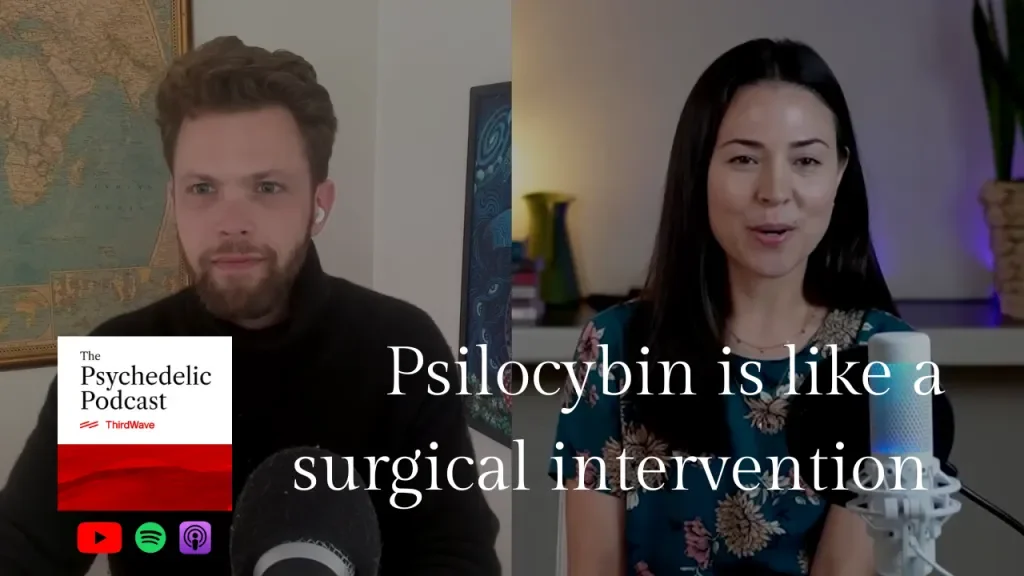Mind Surgery With Psilocybin: Dr. Tracy Townsend on the Third Wave Podcast with Paul Austin
Dr. Tracy Townsend on the Third Wave psychedelic podcast
Dr. Tracy Townsend didn’t just leave orthopedic surgery—she reimagined it. Today, she calls her work “mind surgery,” and it’s every bit as precise, intentional, and transformative as cutting-edge physical operations.
Watch the Podcast Episode below
Dr. Tracy Townsend on the popular Third Wave podcast with Paul Austin
The Surgical Mindset Meets Psychedelics
In medical school, Tracy was drawn to surgery for its ritual and immediacy: you repair a torn ligament, the patient walks out pain‑free. But early on she also fell in love with preventive health—“an ounce of prevention is worth a pound of cure”—and was fascinated by neurology and psychiatry. When, years later, she discovered ceremonial psilocybin use, she saw the same principles at work: targeted intervention, rigorous preparation, and powerful, lasting relief.
“Psilocybin facilitation is more like a surgical intervention than therapy,” she explains. “Clients experience rapid relief—and sustained healing—from symptoms they’ve carried for years.”
Preparing for “Mind Surgery”
Just as you wouldn’t schedule a knee reconstruction without optimizing blood sugar and quitting cigarettes, Tracy’s “Portal Process” includes meticulous prep:
A calm, purpose‑built space where every element—from lighting to playlist—supports the journey
Medical and Psychological Intake
Full 360° health evaluation (physical, mental, family history)
State‑mandated screening (no recent lithium use, no active psychosis, etc.)
Medication Optimization
Coaching clients off SSRIs or benzodiazepines in coordination with their prescriber
Framing psychedelics not as daily “band‑aids,” but as one‑ or two‑session interventions that leverage neuroplasticity for lasting change
Ritual and Set‑and‑Setting
Precision‑dosed psilocybin (up to 50 mg analyte, equivalent to ~10 g mushrooms)
The Operation: Psilocybin Ceremony
On the day of “mind surgery,” Tracy acts much like an OR team lead:
Sterile Environment: A comfortable, private ceremony room replaces the operating theater.
Anesthesia Equivalent: The psilocybin dose—measured down to the milligram—induces deep introspection.
Guidance & Monitoring: Tracy and her co‑facilitators remain present, offering verbal cues, emotional support, and physiological monitoring.
“I liken my role to that of a surgeon: I’m here to hold space, guide the process, and ensure safety. The real healing comes from the client’s own mind.”
Post‑Op Care: Integration & Follow‑Up
Healing doesn’t end when anesthesia wears off. In orthopedic surgery, you follow up with physical therapy; in mind surgery, you follow up with integration:
One‑Week Check‑In Call to process insights while they’re fresh
Monthly Group Integration Meetings for a full year, ensuring new perspectives translate into new habits
This year‑long support is crucial. Just as a repaired joint needs strengthening, a healed mind needs reinforcement.
Why “Mind Surgery” Matters
Framing psychedelic facilitation as surgical intervention shifts expectations:
Precision Over Band‑Aids: Instead of daily pharmaceuticals, clients undergo one or two deep, focused sessions.
Active Healing: Clients aren’t passive recipients; they’re co‑surgeons, actively engaging with emotional wounds.
Sustained Outcomes: Rapid relief often gives way to lasting transformation, much like successful surgery followed by rehab.
“Most people aren’t mentally ill—they’re mentally injured,” Tracy says. “Mind surgery gives those wounds the space, tools, and expert guidance to finally heal.”
Many report significant, sustained relief from depression, anxiety, PTSD, and other chronic conditions after just one macrodose journey plus this robust integration framework.
Learn More
meadowmedicine.org — Dr. Townsend’s current psilocybin facilitation practice
If you’re curious about this radical approach, Dr. Tracy Townsend practices at Meadow Medicine in Oregon, where “mind surgery” isn’t a metaphor—it’s a new model of healing.
